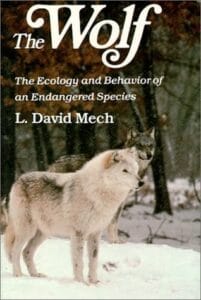Snapshot
The Wolf by David Mech is packed with valuable insights and offers a fascinating window into the world of wolves. Even though the author himself wanted to stop its printing due to ‘some’ inconsistencies with current knowledge, it is still a worthwhile read.
Table of Contents
Wolf is often a ‘friendlier’ animal than we might think
In the first chapter, Mech describes how the wolf’s social nature shapes its personality. Being comparatively smaller than their prey, over millions of years, wolves learned to hunt in groups. This increased their capacity for making emotional attachments to others, making the wolf far less aggressive. They are less averse to backing down from a fight, more likely to give up on prey, and generally more agreeable.

But wolf personality can differ from one individual to another.
‘The strongest impression remaining with me after watching the wolves on numerous occasions was their friendliness.’
Hunting strategies
Wolves are equipped with a range of sophisticated hunting strategies that demonstrate their intelligence and cooperative behavior. One common tactic is the spread formation, where wolves fan out around their prey to flank and encircle it, minimizing escape options and isolating vulnerable prey.
Another key method is the chase and relay strategy, in which wolves take turns pursuing prey over long distances, conserving energy while exhausting the target — particularly effective in challenging environments like deep snow.
When targeting herd animals, wolves use a driving strategy, deliberately harassing the herd from multiple angles to create panic, split the group, and isolate weaker members.
In some cases, especially in wooded or rugged terrain, wolves employ an ambush technique, positioning part of the pack ahead of the prey’s anticipated escape route while other wolves flush the prey toward the waiting hunters.
The alpha wolf
Mech was one of the first wolf researchers to coin the term ‘Alpha Wolf’ to explain a certain dominance hierarchy among wolf packs. But later, this claim turned out to be false — by his own research.
The word alpha applied to wolves has had a long history. For many years, books and articles about wolves have mentioned the alpha male and alpha female or the alpha pair. In much popular writing, the term is still in use today.
Mech explains in the article ‘Whatever Happened to the Term Alpha Wolf’:
‘Rather than viewing a wolf pack as a group of animals organized with a “top dog” that fought its way to the top, or a male-female pair of such aggressive wolves, science has come to understand that most wolf packs are merely family groups formed the same way as human families are formed.’
Reproduction and family life
Wolves’ reproduction and family life differ significantly from those of other animals. A wolf pup about three weeks old can already walk well and may romp and play around the den entrance. By the age of 30 days, the pups determine their social status in the pack among other pups.
The urge to mate doesn’t surface until they are roughly 22 months old. Wolves mate for life, and the book emphasizes the fact that a wolf would only mate with another if their partner were dead or their preferred partner was unavailable. Also, wolves only mate with a relative of the same age.
‘We have never observed an older wolf develop a first preference for a younger one, nor have we ever observed reciprocal preferences between wolves of different ages.’
Conclusions
Everything is based on statistics; therefore, most of the claims carry a certain degree of uncertainty.
Animal behavior is obviously not static — it can change over the years for many reasons. This book was written emphasizing that ever-changing, dynamic nature. But there are an overwhelmingly high number of claims that have not been backed up with a strong statistical foundation.
For instance, I found many places in the book where the author wrote “someone once saw this” type of claims, which could be vulnerable to being proven false, and therefore misleading in the long run.
